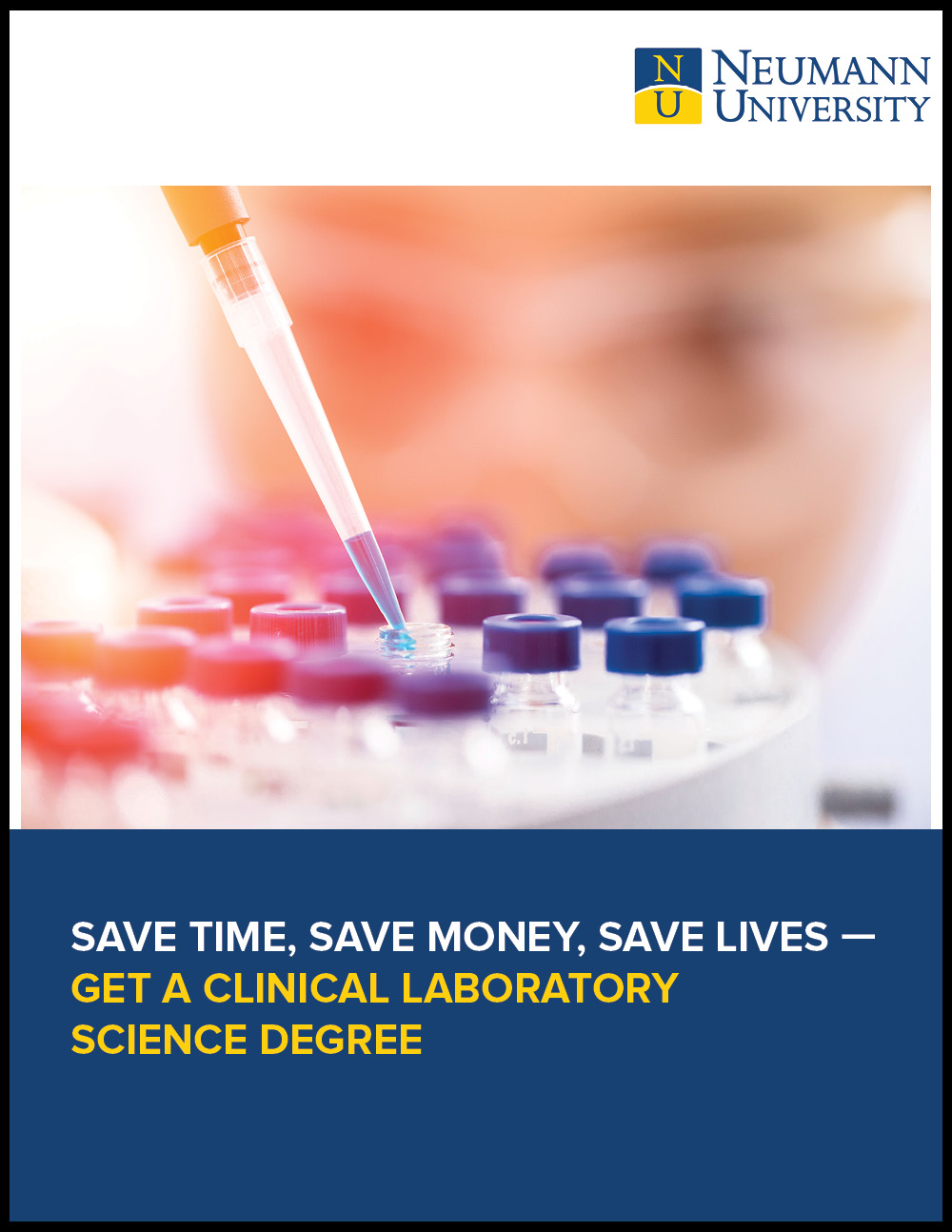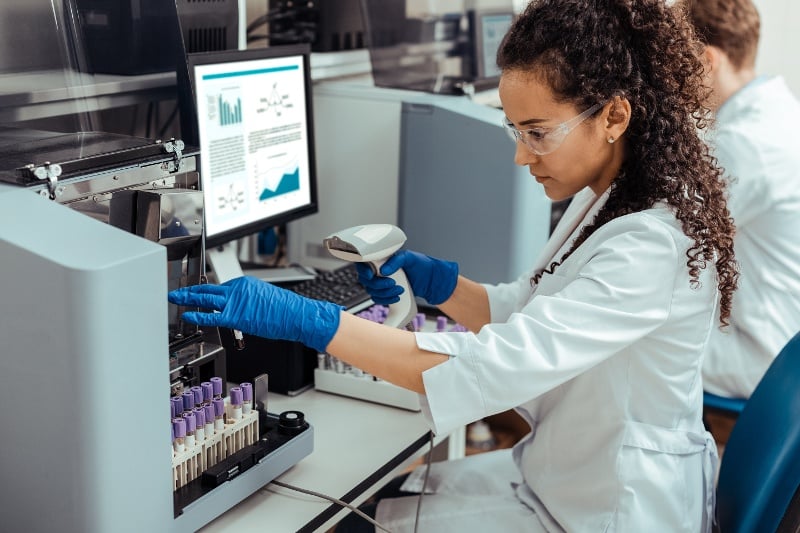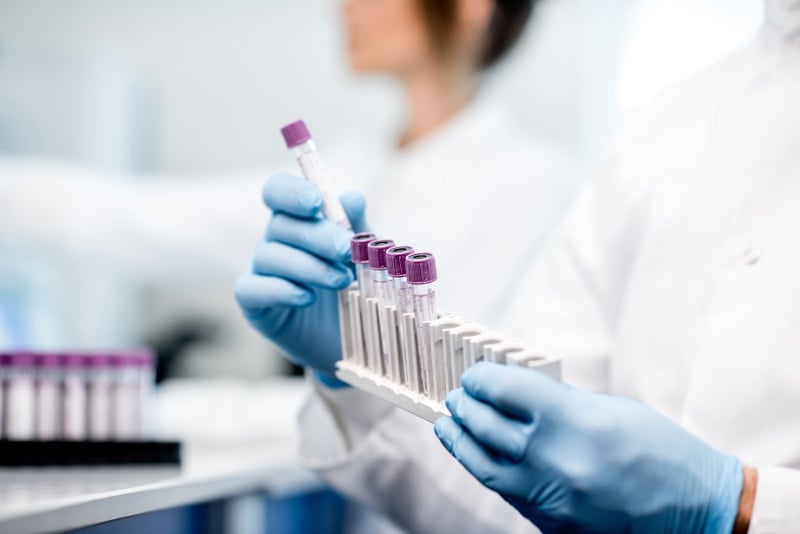 CHALLENGE
CHALLENGEMS in Medical Laboratory Science (STEM)
Not accepting new student applications
Summary of This Program
The MS in Medical Laboratory Science at Neumann University
Did you know that 75 percent of all health care situations call for laboratory testing? For this reason, clinical laboratory scientists who have the sought-after skills and training needed to conduct analysis in laboratory settings will fill a major, growing talent gap.
Medical laboratory science is related to the prevention, diagnosis, and treatment of disease. It combines the study of medicine, the basic sciences of biology and chemistry, and the clinical sciences in order to assist clinical teams in patient diagnosis, treatment, and prevention.
At Neumann University, we are proud to offer a Master of Science in Medical Laboratory Science — uniquely designed to equip you with the tangible analytical skills needed to investigate, analyze, and diagnose diseases.
The master’s in MLS can be completed in two years or less, making it efficient, accessible, affordable, and flexible. The program also adopts a flexible completion format; it’s able to be completed in in-person or hybrid formats.
The master’s in MLS consists of lecture and student laboratory courses at Neumann University followed by a 16- week clinical practicum completed in the laboratories of medical centers, such as Crozer-Chester, Delaware County, VA of Philadelphia, Einstein, Cooper Medical, and Main Line Health System. The extensive time students spend in the clinical environment allows them to develop a high degree of technical and professional competency by the time they complete the program
MS in Clinical Laboratory Science | Features
- 40 credits
- Can be completed in 2 years or less
- In-class and hybrid formats
- Instruction in infectious disease processes, surveillance, and epidemiologic investigation
- Training in advanced management concepts confronting both internal and external challenges to the organization and in various approaches to decision making
- Explores ethical principles required for professional infection control conduct required by law
- Clinical experience integrated into courses
MS in Clinical Laboratory Science | Learning Outcomes
- Perform the full range of clinical laboratory tests in areas such as hematology, clinical chemistry, immunohematology, microbiology, serology/immunology, coagulation, molecular, analytical tests of body fluids and other emerging diagnostics with accuracy.
- Develop a sound scientific knowledge foundation to be prepared and able to interpret, analyze and evaluate scientific knowledge in clinical practice.
- Sit for the certification examination for medical laboratory scientists administered by the American Society for Clinical Pathology Board of Certification (BOC).
- Emerge prepared for careers in medical, clinical, and pharmaceutical laboratories, research, forensics, and medicine.
- Apply scientific principles, such as physiology, immunology, biochemistry, molecular biology, genetics, microbiology, laboratory principles, and methodology to the clinical setting.
- Confirm abnormal results, verify and execute quality control procedures and develop solutions.
MS in Clinical Laboratory Science | Required Courses (40 Credits)
- BIO 520 Advanced Hematology (3 Credits)
- BIO 525 Advanced Hematology Laboratory
(1 Credit) - BIO 530 Advanced Clinical Microbiology
(3 Credits) - BIO 535 Advanced Clinical Microbiology Laboratory (1 Credit)
- BIO 540 Advanced Immunohematology
(3 Credits) - BIO 545 Advanced Immunohematology Laboratory (1 Credit)
- BIO 546 Advanced, Education and Laboratory Information Systems (1 Credit)
- BIO 550 Advanced Clinical Biochemistry
(3 Credits) - BIO 555 Advanced Clinical Biochemistry Laboratory (1 Credit)
- BIO 560 Capstone Seminar (3 Credits)
- BIO 564 Advanced Molecular Diagnostics
(2 Credits) - BIO 570 Advanced Hemostasis, Urinalysis and Body Fluids Lecture (2 Credits)
- BIO 575 Hemostasis, Urinalysis and Body Fluids Laboratory (1 Credit)
- BIO 590 Advanced Clinical Chemistry Practicum (2 Credits)
- BIO 591 Advanced Clinical Immunohematology Practicum (2 Credits)
- BIO 592 Advanced Clinical Hematology, Hemostasis and Body Fluids (2 Credits)
- BIO 593 Advanced Clinical Microbiology and Immunology (2 Credits)
- BIO 597 Infection Prevention (3 Credits)
- OSL 520 Change Management (3 Credits)
MS in Clinical Laboratory Science | Tuition
Tuition is based on the number of credits students are enrolled in. For more information, visit the Office of Financial Assistance.
While Neumann is known for its competitive, affordable sticker price, we know that most graduates need financial assistance of some kind while enrolled in graduate school. For everything you need to know about your financial aid options, download our guide: Offsetting the Cost of Graduate School — Financial Aid for Graduate Students.
MS in Clinical Laboratory Science | Admissions Requirements
Applicants must submit official transcripts from all institutions attended, a graduate writing prompt, a current professional resume, completed pre-requisite form .
For more information on the admissions requirements for this program, visit our admissions page.
Graduate Assistantships at Neumann University
Neumann university offers a number of graduate assistantships in various offices throughout campus including residence life, campus ministry, enrollment management, student leadership & engagement, athletics, knights pantry, the library, university advancement and so many more.
Access Our Free eBook
Save Time, Save Money, Save Lives – Get a Clinical Laboratory Science Degree
Degree Completion and Graduate Admissions Webinar | February 6 at 12:00 PM EST
MS Business and Organizational Leadership Webinar | February 17 at 4:00 PM EST
Frequently Asked Questions
What Can We Answer For You?
What is clinical laboratory science?
Clinical laboratory science is related to the prevention, diagnosis, and treatment of disease. It combines the study of medicine, the basic sciences of biology...
What is clinical laboratory science?
Clinical laboratory science is related to the prevention, diagnosis, and treatment of disease. It combines the study of medicine, the basic sciences of biology and chemistry, and the clinical sciences in order to assist clinical teams in patient diagnosis, treatment, and prevention.
The complex field of clinical laboratory science needs results-driven medical experts who are qualified to perform and interpret laboratory tests and to explain the appropriate use and meaning of laboratory tests to other health-care professionals and to patients.
What is the average salary for those with a Master's in Clinical Laboratory Science?
According to PayScale, the average salary for someone with an MS in Clinical Laboratory Science is $73,000.
How can I become a clinical laboratory scientist?
In order to become a clinical laboratory scientist and secure a successful career, there’s ample data that suggests the value of obtaining an...
How can I become a clinical laboratory scientist?
In order to become a clinical laboratory scientist and secure a successful career, there’s ample data that suggests the value of obtaining an advanced degree in this discipline. For instance, the median annual salary for a clinical laboratory scientist is $60,605, according to PayScale, but pay tends to be higher for medical laboratory scientists with a master’s degree.
You want to look for a clinical laboratory science program that...
- Provides students the opportunity to learn in clinical environments
- Places significant emphasis on infection prevention
- Teaches students advanced management techniques
- Prepares graduates to become certified as a Medical Laboratory Scientist
- Offers an efficient, accelerated option for obtaining the degree
- Has an excellent reputation in the educational and laboratory communities
- Documents students’ strong record of professional success
Where do clinical laboratory scientists work?
Many CLS professionals work in hospitals, but others choose to work in environments, such as:
- Medical Diagnostic Laboratories
- Physician Laboratories
- Core Laboratories
- Private Laboratories
- Pharmaceutical Laboratories
- Research Laboratories
What is pastoral clinical mental health counseling?
So, what is pastoral clinical mental health counseling? Students pursuing a master's in pastoral clinical mental health counseling receive the same...
What is pastoral clinical mental health counseling?
So, what is pastoral clinical mental health counseling? Students pursuing a master's in pastoral clinical mental health counseling receive the same training and instruction as other clinical mental health counselors, but they integrate a pastoral perspective into every part of who they are and what they do.
This integration of spirituality allows pastoral counselors to care for their clients from a holistic and integrated perspective, acknowledging the connection between the body, mind, and spirit. It’s one of the most impactful fields today.
What is the learning format in the master’s in CLS?
The Master of Science in Clinical Laboratory Science (40 credits) can be completed in two years or less. It’s able to be completed in in-person or hybrid formats.
What does the clinical practicum in the master’s in CLS consist of?
The master’s in CLS consists of lecture and student laboratory courses at Neumann University followed by a 16- week clinical...
What does the clinical practicum in the master’s in CLS consist of?
The master’s in CLS consists of lecture and student laboratory courses at Neumann University followed by a 16- week clinical practicum completed in the laboratories of medical centers, such as:
- Crozer-Chester
- Delaware County
- VA of Philadelphia
- Einstein
- Cooper Medical
- Main Line Health System
The extensive time students spend in the clinical environment allows them to develop a high degree of technical and professional competency by the time they complete the program.
How do I apply to Neumann’s master’s in CLS?
We know applying to graduate school can seem challenging, but in an effort to make it as easy as possible, we’ve outlined the materials and steps you need...
How do I apply to Neumann’s master’s in CLS?
We know applying to graduate school can seem challenging, but in an effort to make it as easy as possible, we’ve outlined the materials and steps you need to take in order to submit a complete graduate school application:
- A completed Graduate Student Application online through www.neumann.edu
- Official transcripts from all regionally accredited institutions (WES or ECE evaluated if an international school)
- Have an undergraduate or graduate GPA of 3.00 (outstanding applicants whose GPAs are less than 3.00 may be considered for conditional acceptance)
- Resume
- Letter of intent detailing educational goals
- Two official letters of reference on official institutional letterhead
- Provide results of TOEFL (Test of English as a Foreign Language) from applicants whose first language is from a non-English speaking country or for whom English is a second language-minimum overall score of 84 with a minimum score of 26 on the verbal subtest on the Internet-based TOEFL. Applicants may also complete the Cambridge Michigan Language Assessment (CaMLA) MELAB. A total passing score of 81 and a speaking section of 3 is required.
- Note: Students applying for the MS in Clinical Laboratory Scientist must submit a pre-requisite form.
Once all admissions materials have been received and processed through the Office of Admissions, the graduate Program Director will arrange for an interview, if appropriate, following a review of all candidate credentials.
How to Become a Clinical Laboratory Scientist (And What to Look for in a Program)
Clinical laboratory scientists function as detectives — investigating, analyzing, and determining the causes of diseases.
They perform routine and...


